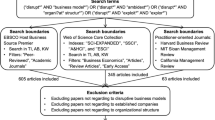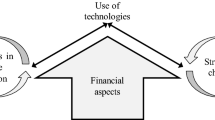Abstract
Due to digitalization and disruptive innovations, many established companies are faced with the task of adapting their business models and processes to new requirements. To avoid risks and exploit opportunities, spin-offs are founded for this purpose.
The research question to be answered is if spin-off strategies can be based on a general form and if measures can be clustered. For this purpose, literature was evaluated and interviews with experts were conducted. In this way a structured approach could be developed, which is based on four result clusters: reasons, arguments, differentiation and success factors.
The results are particularly interesting for the management of spin-offs and for companies that want to set up one.
Access this chapter
Tax calculation will be finalised at checkout
Purchases are for personal use only
Similar content being viewed by others
Notes
- 1.
Due to manual evaluation of the information of the respective internet website.
References
Doz, Y.L., Kosonen, M.: Fast Strategy. How Strategic Agility Will Help You Stay Ahead of the Game, 1st edn. Wharton School Publ, Harlow (2008)
Potentiale der Digitalisierung für mehr Ressourceneffizienz nutzen, Berlin (2018)
Krieger, W., Hofmann, S.: Digitalisierung – die neuen Anforderungen. In: Krieger, W., Hofmann, S. (eds.) Blended Learning für die Unternehmensdigitalisierung. essentials, pp. 3–7. Springer, Wiesbaden (2018). https://doi.org/10.1007/978-3-658-19204-4_2
Eisenbeis, U., et al.: Spin-off als Organisationskonzept. Springer, Wiesbaden (2020). https://doi.org/10.1007/978-3-658-28524-1
Christensen, C.M.: The Innovator’s Dilemma. When New Technologies Cause Great Firms to Fail. The Management of Innovation and Change Series. Harvard Business School Press, Boston (2008)
Sauberschwarz, L., Weiß, L.: Das Comeback der Konzerne. Wie große Unternehmen mit effizienten Innovationen den Kampf gegen disruptive Start-ups gewinnen. Verlag Franz Vahlen, München (2018)
Forbes Media LLC: The World’s Largest Public Companies. 2008 Ranking (2008). https://www.forbes.com/lists/2008/18/biz_2000global08_The-Global-2000_Rank.html. Accessed 1 Apr 2020
Forbes Media LLC: The World’s Largest Public Companies. 2019 Ranking (2019). https://www.forbes.com/global2000/list/#header:marketValue_sortreverse:true. Accessed 1 Apr 2020
Digitale Geschäftsmodelle. Themenheft Mittelstand-Digital, Berlin (2017). https://www.bmwi.de/Redaktion/DE/Publikationen/Mittelstand/mittelstand-digital-digitale-geschaeftsmodelle.pdf?__blob=publicationFile&v=7. Accessed 1 May 2020
Gassmann, O., Frankenberger, K., Csik, M.: Geschäftsmodelle entwickeln. 55 innovative Konzepte mit dem St. Galler Business Model Navigator, 2nd edn. Hanser, München (2017)
Meinhardt, S., Popp, K.M.: Digitale Geschäftsmodelle. HMD Praxis der Wirtschaftsinformatik 55(2), 229–230 (2018). https://doi.org/10.1365/s40702-018-0417-7
Kadam, S., Apte, D.: A survey on short life cycle time series forecasting. Int. J. Appl. Innov. Eng. Manag. (IJAIEM) 4, 445–449 (2015)
Niemann, J.: Ökonomische Bewertung von Produktlebensläufen – Vom Life Cycle Costing zum Life Cycle Controlling. In: Spath, D., Westkämper, E., Bullinger, H.-J., Warnecke, H.-J. (eds.) Neue Entwicklungen in der Unternehmensorganisation. VDI-Buch, pp. 247–261. Springer, Heidelberg (2017). https://doi.org/10.1007/978-3-662-55426-5_27
Kohtamäki, M., Parida, V., Patel, P.C., Gebauer, H.: The relationship between digitalization and servitization: the role of servitization in capturing the financial potential of digitalization. Technol. Forecast. Soc. Change (2020). https://doi.org/10.1016/j.techfore.2019.119804
Papasabbas, L., Pfuderer, N., Muntschick, V.: Neo-Ökologie. Der wichtigste Megatrend unserer Zeit, 1st edn. Trendstudie Zukunftsinstitut (2019)
The SPI Manifesto, Alcala, EuroSPI 2009 (2010). http://2019.eurospi.net/images/eurospi/spi_manifesto.pdf. Accessed 25 May 2020
Henriette, E., Feki, M., Boughzala, I.: The shape of digital transformation: a systematic literature review. In: MCIS, vol. 9 (2015)
Charmaz, K.: Constructing Grounded Theory. Introducing Qualitative Methods, 2nd edn. SAGE Publications Ltd., London (2014)
Osterwalder, A., Pigneur, Y.: Business model generation. Ein Handbuch für Visionäre, Spielveränderer und Herausforderer, 1st edn. Campus Verlag, Frankfurt, New York (2011)
Wirtz, B.W.: Business Model Management. Design - Instrumente - Erfolgsfaktoren von Geschäftsmodellen, 4th edn. Springer Gabler, Wiesbaden (2018)
Wiesinger, R.: Welcher Unternehmenskultur bedarf es, damit Innovationen gelingen können? In: Herget, J., Strobl, H. (eds.) Unternehmenskultur in der Praxis. Grundlagen – Methoden – Best Practices, pp. 93–105. Springer, Wiesbaden (2018). https://doi.org/10.1007/978-3-658-18565-7_6
Maldaner, L.F., Fiorin, F.S.: An analysis framework of corporate spin-off creation focused on parent company: a case study of a traditional industrial company from the state of Rio Grande Do Sul, south of Brazil. Revista Base (Administração e Contabilidade) da UNISINOS [en linea], pp. 56–67 (2018)
Corsino, M., Giuri, P., Torrisi, S.: Technology spin-offs: teamwork, autonomy, and the exploitation of business opportunities. J. Technol. Transfer 44(5), 1603–1637 (2018). https://doi.org/10.1007/s10961-018-9669-1
Vollmar, J.: Spin-offs, Diversifikation und Shareholder Value. Eine theorie- und hypothesengeleitete empirische Analyse europäischer Unternehmensabspaltungen. Springer Gabler, Wiesbaden (2014). https://doi.org/10.1007/978-3-658-06559-1. Zugl.: Sankt Gallen, Univ., Dissertation
Clarysse, B., Wright, M., van de Velde, E.: Entrepreneurial origin, technological knowledge, and the growth of spin-off companies. J. Manag. Stud. (2011). https://doi.org/10.1111/j.1467-6486.2010.00991.x
Interview partner 1 (COO of a spinoff): Spin-Off-Strategien etablierter Unternehmen in Zeiten von Digitalisierung und Disruption, personal communication, Düsseldorf (2020)
Interview partner 2 (managing director of a consulting company): Spin-Off-Strategien etablierter Unternehmen in Zeiten von Digitalisierung und Disruption, personal communication, Düsseldorf (2020)
Author information
Authors and Affiliations
Corresponding author
Editor information
Editors and Affiliations
Rights and permissions
Copyright information
© 2020 Springer Nature Switzerland AG
About this paper
Cite this paper
Kretschmar, D., Niemann, J., Müller, F. (2020). Spin-Off Strategies of Established Companies Due to Digitalization and Disruption. In: Yilmaz, M., Niemann, J., Clarke, P., Messnarz, R. (eds) Systems, Software and Services Process Improvement. EuroSPI 2020. Communications in Computer and Information Science, vol 1251. Springer, Cham. https://doi.org/10.1007/978-3-030-56441-4_58
Download citation
DOI: https://doi.org/10.1007/978-3-030-56441-4_58
Published:
Publisher Name: Springer, Cham
Print ISBN: 978-3-030-56440-7
Online ISBN: 978-3-030-56441-4
eBook Packages: Computer ScienceComputer Science (R0)




